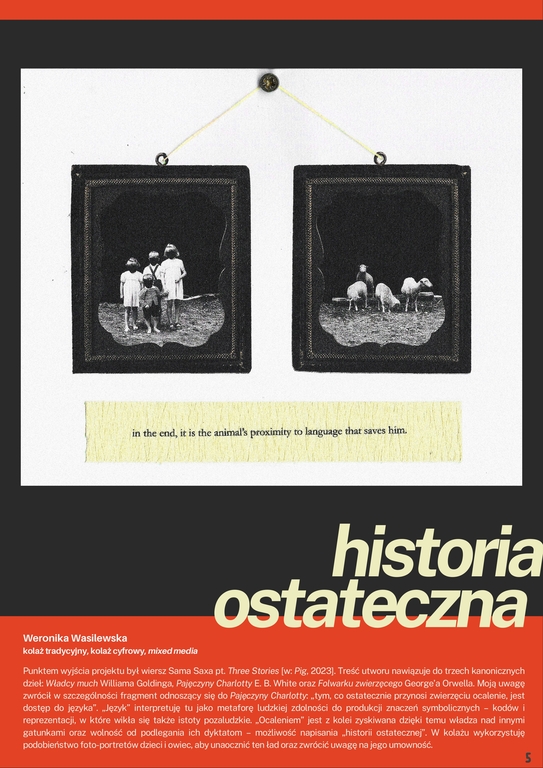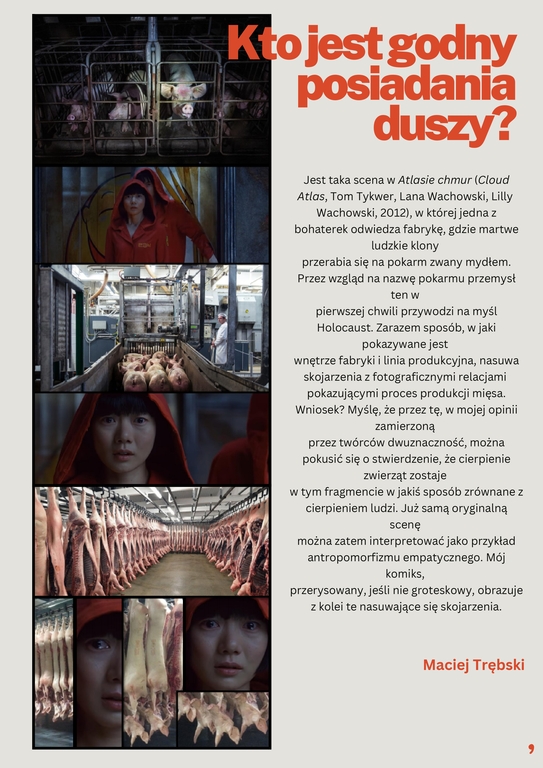
The ability to work in a team, improve organisational skills, solve problems creatively and argue effectively – there are many more reasons to get involved in practical credit projects, and many of them were discovered by students of Audiovisual Media and Digital Culture, who created their own zine as part of the course "(Non)anthropocentric Narratives. Non-human Animals in Film".
What is a zine?
Publications created by amateur enthusiasts are called zines. A zine can come in many forms, from simple, handmade booklets to more complex and professional-looking publications. Zines are distinguished by their personal, individual style, which reflects the interests and passions of their authors.
What makes our zine stand out the most is that it is independent. We organised an art-zine focused on art in an instinctive, spontaneous way. Most often, fan groups and non-professional groups focus on this form, and since we are students, we can count ourselves among them!
– some of the authors of the zine, Julia Czeszewska and Maciej Kujawski, begin the story about their project.
The zine was dedicated to the subject of animals. The authors, using interesting techniques of artistic expression, decided to illustrate the subjectivity and independence of selected animals in a world shared with people.
It seems to me that each of us put a lot of effort into our work and this way wanted to express our artistic talents. Some people chose comics and poems, so I think it is a form of self-reflection and artistic expression
– syas Julia.

Inspiring homework
The ZOO-Zine was created as part of… homework! The course participants were asked to create their own work of art (using any technique of their choice) on the topic of non-human animal subjectivity in various contexts. The result of the students’ work was so satisfying that the individual works were transformed into a coherent, thought-provoking publication:
This project came about spontaneously. Students prepared homework for one class and it turned out that they were very creative. Since we all liked the work so much, we have decided to turn it into something bigger and create a zine
– says the lecturer, mgr Patrycja Chuszcz.
This unusual homework assignment turned out a hit – especially for students looking for inspiration for creative action.
The most fun was the organisation. It was a change from typical homework assignments. We have noticed that through such creative tasks, which require engagement and the production of something, information is better remembered. The discussion that follows is more interesting and can produce something that can be disseminated.
– conclude Julia i Maciej.

Discussion is important
Practical projects carried out by students of the Faculty of Philology of the University of Lodz are gaining popularity. Participants in workshops and exercises conducted by academic staff of the faculty increasingly have the opportunity to acquire professional knowledge while developing useful skills. It is also an opportunity to engage in inspiring discussions about culture, art and equality.
An example of a work that really impressed me is the poem "My Man", which makes one think about whether an animal is capable of writing a poem and being a lyrical subject in a text. It is man who has the power over words, and attempting to take on an animal perspective from the human side is almost impossible
– concludes the newly-minted MA graduate, Maciej.
The ZOO-Zin contains not only inspiring poetic items, but also graphic ones. Students, who chose to focus on visually depicting the issues taken up, enriched their works with thought-provoking commentaries.
I really liked the work by Emilia Zalewska, who took a beautiful photo of her dog standing on a sofa and dressed in human clothes. It is such a confrontation between the animal world and the human world. On the one hand, dressing up an animal is a way of showing it in a charming way as a human companion, and on the other, it is a critique of people's tendency to humanise animals...
– comments Julia.

Modular classes
The course "(Non)anthropocentric Narratives. Non-human Animals in Film" was conducted in the past academic year as part of the audiovisual narrative module in the field of Audiovisual Media and Digital Culture. During the elective, students, among other things, jointly analysed how films depict animals and how these representations have changed over time.
Students looked at different types of cinema – from the mainstream to experimental – to understand the evolution of animal representation in audiovisual narratives. The course touched on the anthropocentric properties of film and the possibilities of presenting a zoocentric perspective. An important aspect of the course was the role of the viewer in the reception of films depicting animals and the analysis of key narrative concepts such as empathy, sympathy and subjectivisation
– explains the lecturer, mgr Patrycja Chuszcz.
The course began with John Berger's "Why Look at Animals?" essay. During the analysis, the participants looked at technological changes in film and the ways in which animals are used on film sets. The elective was very much appreciated by the students.
Modular classes are one of the best things about studying! They give us a lot of freedom. We are not held in check. We have the opportunity to choose and some agency over our own fate during our studies. The electives expand critical thinking and skepticism towards narrative in art
– add Julia and Maciej.
Download the ZOO-Zine
All creative works by students form the Faculty of Philology have been published in the ZOO-Zine, the electronic version of which can be downloaded using the file provided below: ZOO-zine 2024.
